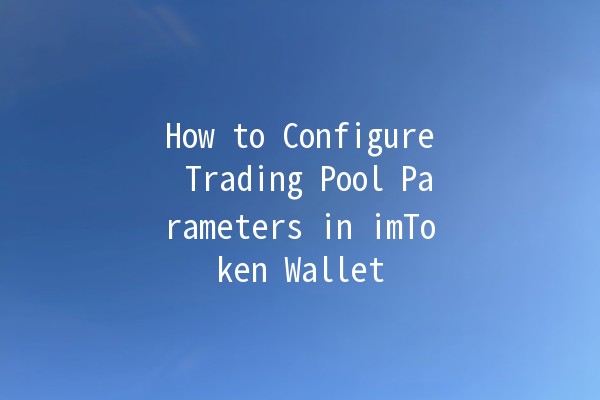As the cryptocurrency market continues to evolve, managing your digital assets has become increasingly important. Among the various tools available, the imToken wallet stands out as a popular solution for efficiently handling cryptocurrencies. One of the key features of imToken is its ability to configure trading pool parameters, which can significantly impact your trading strategies. In this article, we will explore how to effectively configure these parameters and offer productive tips to optimize your trading experience.
Before diving into the configuration process, it is essential to understand what trading pool parameters are. Trading pools, generally speaking, are collections of liquidity providers who pool their assets together to facilitate trading. This is particularly relevant in decentralized finance (DeFi), where liquidity pools allow users to swap tokens without relying on traditional exchanges.
In imToken, trading pool parameters refer to various settings that govern how your wallet interacts with these liquidity pools. Configuring these parameters correctly can enhance your trading efficiency and profitability. The main parameters often include:

Let’s explore each parameter in depth, along with practical tips to optimize your experience.
Explanation: Slippage occurs when the final execution price of a trade differs from the expected price due to changes in market conditions. Setting an appropriate slippage tolerance is crucial in volatile markets.
Practical Tip: For most trades, a slippage tolerance of 1% to 3% is advisable. If you are trading a large amount, consider a lower tolerance to ensure you don’t lose too much on a single trade. Conversely, in highly volatile conditions, you may need to increase this tolerance temporarily.
Explanation: Liquidity provider fees are charges incurred when trading through a liquidity pool. These fees can vary between pools and directly affect your overall cost of trading.
Practical Tip: Always compare the liquidity provider fees across different pools. For example, if Pool A has a fee of 0.3% and Pool B has 0.5%, selecting Pool A will save you costs. Use aggregation tools available in imToken to find the most favorable pool.
Explanation: Not all liquidity pools are equal. Each offers different liquidity levels, trading options, and fees, making it vital to select the one that aligns with your trading goals.
Practical Tip: If you are looking for a specific token pair, assess the trading volumes of the pools. Higher volume usually equals better liquidity, which may reduce the chance of slippage. In imToken, you can view the historical performance and volume metrics of different pools which can guide your choice.
Explanation: Setting a maximum transaction amount can protect you from unexpected losses due to market volatility. This prevents you from executing a trade substantially larger than intended.
Practical Tip: Start with smaller transactions to gauge the market dynamics before committing larger amounts. Gradually increase your cap based on your confidence and knowledge of the market.
Explanation: Gas fees vary depending on network congestion, and inefficient management can lead to significantly higher costs.
Practical Tip: Monitor Ethereum gas prices via tools integrated into imToken and try to trade during offpeak hours (typically late at night or early morning UTC time) when gas prices may be lower. Adjust your gas strategy based on current network conditions to minimize costs while ensuring timely transaction confirmations.
To further enhance your trading efficiency with imToken, consider the following techniques:
Leveraging advanced charting tools available within the imToken interface can help you make more informed decisions. Monitor price trends, apply technical analysis, and utilize indicators to anticipate market movements.
Staying informed about the latest market trends and developments can significantly impact your trading success. Engage with reputable crypto news sources or platforms to receive realtime updates.
Join community forums or social media groups related to cryptocurrencies. Engaging with experienced traders can provide valuable insights, tips, and strategies that can aid your trading efforts.
Don't hesitate to experiment with different trading strategies such as day trading, swing trading, or holding longterm. Each has its advantages and will help you develop a better understanding of market dynamics.
Maintain a trading journal to track your trades. Documenting successes and failures will help you identify patterns and improve your trading strategies in the long run.
Slippage tolerance varies depending on market conditions. A range of 1% to 3% is generally acceptable for most users, but during extreme volatility, you might need to expand this percentage to avoid missed opportunities.
Minimizing gas fees requires timing and monitoring network congestion. Choose to trade during offpeak hours, continually monitor gas prices, and consider using Layer 2 solutions if available for your specific token.
Using different liquidity pools can give you access to varying fee structures and liquidity levels. It is wise to evaluate your options based on the tokens you are trading to find the most beneficial pools.
The selection of a trading pool impacts your final trade cost, available liquidity, and overall trading efficiency. Different pools have distinct liquidity attributes and fee structures, so it’s crucial to compare before executing trades.
Setting a maximum transaction limit helps control the risks associated with market volatility, preventing significant unexpected losses. It allows you to trade with a more strategic and calculated mindset.
Yes, once a trade is executed, you can revert back and adjust your trading pool parameters accordingly. It is always a good practice to recalibrate these settings prior to new trades to stay aligned with market conditions.
By following the above practices and tips for configuring trading pool parameters in your imToken Wallet, you can enhance your trading experience. These small adjustments can lead to significant changes in your profitability and overall trading efficiency. Happy trading!